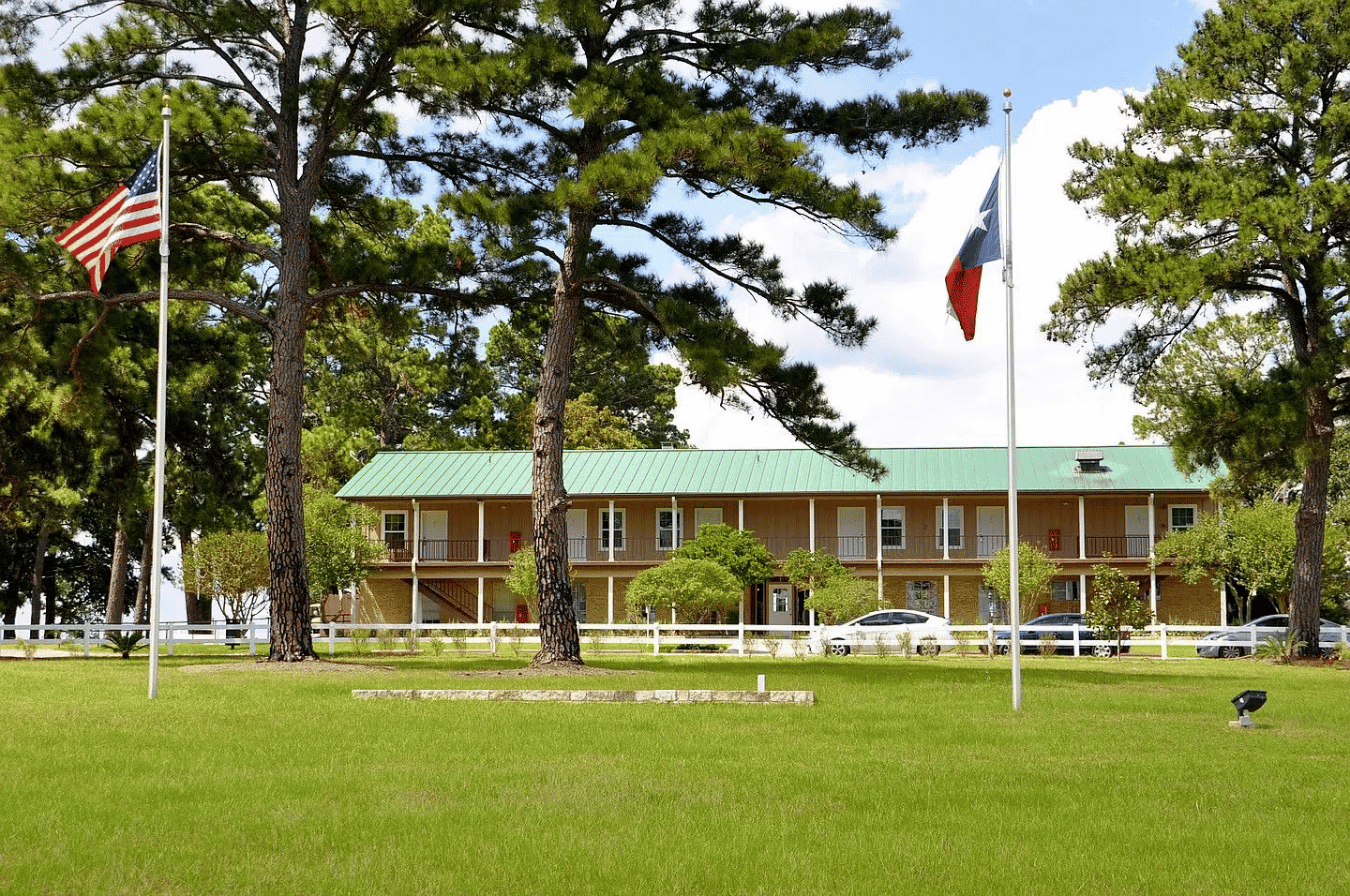
Willow Springs Recovery - Austin, Texas
GET HONEST & ACCURATE QUOTE
Dual Diagnosis in Sugar Land, TX
Top rated addiction treatment located on 38 acres of quiet and calming scenery.
- Keep your phone and laptop
- Safe 24/7 monitored detox
- SMART options
- Dual diagnosis programs
- Long-term arrangements
- Thorough aftercare planning
- Located in Bastrop, Texas
- Out of state options in CA, CO and IL
Check your coverage and get informed on admission process! Call us at:
 555-555-5555*
555-555-5555*
*HIPPA Compliant and 100% confidential
MAXIMIZE YOUR PPO COVERAGE WITH OUR HELP
We will work with insurance to get you the best possible coverage and minimize expenses.
Sugar Land, Texas, is Fort Bend County’s largest city, situated about 20 miles southwest of Houston.
The area (and far beyond) has experienced substance use disorder.
More than 700 million pills of controlled substances were seized in a 2021 drug bust in the county. Approximately 100 million doses were also unaccounted for, pointing to a possible black market situation.
In 2019 the DEA said the area’s top drug threats included:
- Methamphetamine
- Cocaine
- Heroin and opioids
- Cannabis
- Synthetic cannabinoids
The University of Texas at Austin’s Addiction Research Institute found that methamphetamine and fentanyl use is rising. Heroin, too. And while cocaine use dropped for a spell, that was starting to reverse course. And while benzodiazepine abuse was dropping, Xanax (or alprazolam) deaths were cycling upwards.
In fact, between 1999 and 2020, drug deaths of all types — except for methadone — have gone up. Synthetic narcotics (fentanyl in particular), psychostimulants, and cocaine deaths saw the most significant increases.
Treatment programs also are treating more people for methamphetamine addiction. For example, more than one in five (22%) of all rehab admissions in 2021 were for meth dependence, compared to just 3% of admits seeking help for meth addiction in 1995.
One common companion of addiction is mental illness. Such cases are called dual diagnosis or co-occurring disorders. The best way to help dual diagnosis patients is to treat both conditions. Dual diagnosis addiction treatment in Sugar Land, TX, can help.
Mental Health and Substance Use Disorder in Texas
Mental illness includes many conditions like depression, generalized anxiety disorder, or bipolar disorder.
These illnesses affect a person’s life in many ways: Emotionally, psychologically, and socially. Their behaviors can be shaped by mental disorders, too. No one is immune from mental illness, either. Money (or great insurance) might be able to fast-track you to treatment, but it can’t shield you from it. Neither will your age, race, ethnicity, gender (or gender identity), sexual orientation, or faith (or lack thereof).
And then we land in late 2019/early 2020, with COVID-19 arriving. The pandemic effectively shut the world down for several months (and longer in some areas), and people’s mental health took a hit.
In 2019, 10% of adults said they had anxiety or depression. Since May 2020, that number has tripled to more than three in 10. Fast-forward to 2021, and 34.2% of Texas adults said they had anxiety and/or depressive disorder. That surpasses the 31.6% depression/anxiety rate among U.S. adults.
Substance use has ticked upwards, too. As of September 2020, 15.1% of U.S. adults admitted they’d started taking drugs or using more during the pandemic. Drug overdose deaths went up during that time, too. Opioids make up a big slice of that pie, with more than half (50.5%, or 2,116) of all Texas’s 2020 drug overdose deaths involving opioids.
Dual Diagnosis in Texas
A lot of Texans live in mental health care deserts, but less than one in three (32.9%) get the treatment they want or need.
Left untreated, this can lead to more problems, including substance use disorder.
Some addiction rehab providers estimate two-thirds of their patients have co-occurring disorders (both a mental illness and substance use disorder).
Addiction and mental illness can be uncomfortably intertwined sometimes. One can cause or result from the other. Mental illness, for example, might drive a person to self-medicate with drugs or alcohol. But abusing drugs or alcohol can contribute to the development of some mental illnesses, too.
When a person has both conditions, the best approach is to treat both. For example, dual diagnosis rehab in Sugar Land, TX, can help with that.
Dual Diagnosis Rehabs in Sugar Land, TX
Dual diagnosis rehab shares some common ground with standard inpatient treatment, but the co-occurring mental disorder will be treated at the same time. That tends to lead to better outcomes.
Checking into a dual diagnosis addiction treatment in Sugar Land, TX, you can expect a complete checkup, so the medical staff knows what needs to be treated immediately as well as what will need attention during your stay. Once you’re screened for mental and physical health, a treatment plan is put into place. Then get ready for:
- Detoxification: The goal here is to get your system free of drugs and/or alcohol. Withdrawal can be painful and sometimes dangerous, so medical oversight is a good idea. The facility’s medical staff can provide around-the-clock monitoring. They can give you medication for side effects like headaches, nausea, and anxiety. If you have a co-occurring disorder, you’ll begin (or continue) treatment for that, too.
- Inpatient rehabilitation. After detox is finished, you will move into a private or shared room and start recovery. Psychotherapy can help you understand why you use alcohol or drugs. (It could stem from any number of things — trauma, genetics, a co-occurring disorder, for example.) Talk therapy can help you pick up healthier ways to cope with stress, anxiety, and other triggers. Group therapy is a great way to interact with and learn from others who share similar problems. Rehabs offer other activities, too, like courses to teach life skills or holistic options like yoga and meditation to encourage improved mental health.
- Aftercare. This gets you ready for life after rehab to help you avoid relapse. You might plan to keep in touch with the dual diagnosis drug rehab in Sugar Land, TX, to discuss any wins, worries, and challenges. You’ll also have other contacts to help you preserve your sobriety, including counselors, therapists, support groups, and alumni groups.
Conditions Addressed in Dual Diagnosis Treatment
Addiction treatment facilities that offer dual diagnosis alcohol and drug rehab in Sugar Land, TX, will help you work through your substance use disorder. After detox, you’ll ease into a schedule of group and individual therapies. You’ll receive treatment for any co-occurring issues like:
- Post-traumatic stress disorder
- Generalized anxiety disorder
- Depression
- Bipolar disorder
- Schizophrenia
- Thoughts of or attempts at suicide
Dual diagnosis treatment facilities understand it’s important for their patients to receive help for both addictions and mental disorders. Leaving one condition untreated could worsen the other — or even both — conditions.
The Importance of Therapy
Mental health and addiction treatment centers in Sugar Land, TX, will offer talk therapies to help patients better understand their addiction and mental health struggles. Patients learn why they continue to use drugs and find new ways of coping that are better for them.
Several types of talk therapies can help with dual diagnosis treatment in Sugar Land, TX:
- Cognitive-behavioral therapy (CBT). The goal is to help you spot unhealthy thinking patterns that co-occur with many SUD and mental disorders. You’ll practice new ways of handling triggers like cravings or stress.
- Dialectical behavior therapy (DBT). DBT helps you come to terms with ideas that seem in conflict with one another. For example, if a person is depressed and wants to stay home and sleep all day, DBT might suggest they fight that impulse and go out for a walk or visit friends instead.
- Contingency management (CM). This approach earns you rewards for meeting goals like passing a drug test or not missing therapy sessions.
Dual diagnosis treatment programs in Sugar Land, TX, can help their patients work through their addictions and mental disorders. Treatment can be intense but ultimately an empowering and life-saving journey.
Sources
Medical disclaimer:
Sunshine Behavioral Health strives to help people who are facing substance abuse, addiction, mental health disorders, or a combination of these conditions. It does this by providing compassionate care and evidence-based content that addresses health, treatment, and recovery.
Licensed medical professionals review material we publish on our site. The material is not a substitute for qualified medical diagnoses, treatment, or advice. It should not be used to replace the suggestions of your personal physician or other health care professionals.




